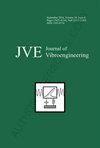Mechanical characteristics of a corset type structure with negative Poisson’s ratio
IF 0.9
Q4 ENGINEERING, MECHANICAL
引用次数: 0
Abstract
For mechanical metamaterials and their vibration isolation ability, a new corset type structure (CTS) is designed from the inward hexagonal steel structure by applying fillet at the inward corners. Ten CTS cells are born by using the different fillet radius. The fillet radius is 10 mm to 100 mm, but the cell mass remains constant when the plate has the same thickness. The static deformation, vibration modality and harmonic response of these NPR structures are analyzed in this paper. These CTS cells are modeled by using the finite element method (FEM) with a uniform grids. In static analysis, a surface load and a point load on the top plate are respectively considered to study the elastic deformation, the NPR and the stiffness of CTS cells with different fillet radii and thicknesses. These CTS cells have a greater NPR and a higher stiffness than the original inward hexagonal steel structure. In modal analysis, the natural frequency, the eigenmode and the fixed modality are numerically computed. These frequency values and displacement distributions of CTS cells show that these CTS cells have a higher vibration frequency than the origin inward hexagonal structure cell. In harmonic response analysis, the frequency domain is from 1 Hz to 1000 Hz, and the excitation force is on the top surface of the upper plate. All displacement responses of these CTS cells are analyzed. The harmonic response analysis result shows that the resonance magnitude can be significantly suppressed by these new CTS cells. The analysis result presents the characteristics of this new CTS, and it is beneficial for the vibration isolation in engineering application.负泊松比紧身胸衣结构的力学特性
针对机械超材料及其隔振能力,在向内六角形钢结构的基础上,在向内角处加圆角,设计了一种新型的束腰式结构。利用不同的圆角半径生成10个CTS细胞。圆角半径为10mm ~ 100mm,但当平板厚度相同时,细胞质量保持不变。本文分析了这些结构的静变形、振动模态和谐波响应。采用均匀网格的有限元方法对这些CTS单元进行了建模。在静力分析中,分别考虑顶板的表面荷载和点荷载,研究不同圆角半径和圆角厚度的CTS单元的弹性变形、NPR和刚度。这些CTS细胞比原来的内向六角钢结构具有更大的NPR和更高的刚度。在模态分析中,对固有频率、特征模态和固定模态进行了数值计算。CTS细胞的频率值和位移分布表明,这些CTS细胞具有比原始内向六边形结构细胞更高的振动频率。在谐波响应分析中,频域范围为1hz ~ 1000hz,激振力在上板顶面上。对CTS单元的位移响应进行了分析。谐波响应分析结果表明,这些新型CTS细胞可以显著抑制谐振幅度。分析结果揭示了这种新型隔振器的特性,有利于工程应用中的隔振。
本文章由计算机程序翻译,如有差异,请以英文原文为准。
求助全文
约1分钟内获得全文
求助全文
来源期刊

Journal of Vibroengineering
工程技术-工程:机械
CiteScore
1.70
自引率
0.00%
发文量
97
审稿时长
4.5 months
期刊介绍:
Journal of VIBROENGINEERING (JVE) ISSN 1392-8716 is a prestigious peer reviewed International Journal specializing in theoretical and practical aspects of Vibration Engineering. It is indexed in ESCI and other major databases. Published every 1.5 months (8 times yearly), the journal attracts attention from the International Engineering Community.
 求助内容:
求助内容: 应助结果提醒方式:
应助结果提醒方式:


